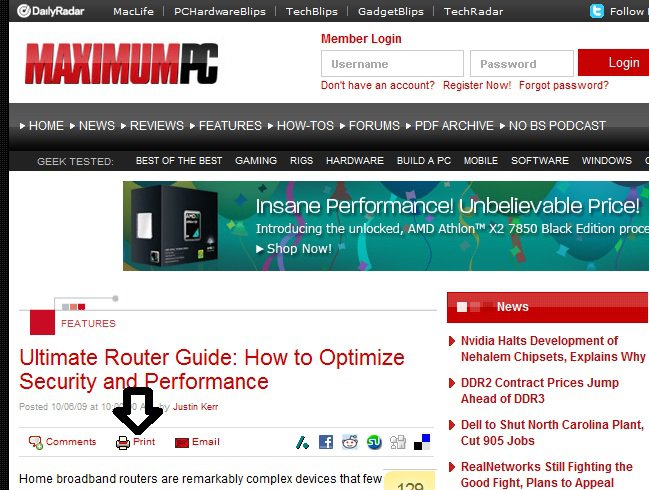Ultimate Router Guide: How to Optimize Security and Performance
Home broadband routers are remarkably complex devices that few ever take the time to truly understand. As long as the lights are blinking, and webpages load, most people are inclined to leave them be. The few brave souls who venture into the firmware are often rewarded with a maze of menus that betray the true complexity of these underappreciated appliances. Wireless channels, security modes, and even port forwarding can be frustrating concepts for those without a networking background, but are absolutely critical to understanding how to optimize your home network. In this guide we will teach you the finer points of security, as well as give you surefire ways to boost your router's wireless range and optimize performance.
Why are Routers so Important
When most people think about online security, they often assume virus scanners, spyware detectors, and even firewall software are the most important weapons to level against those who would seek to exploit their machines. In reality, the router is one of the most powerful tools in your arsenal, and it rarely gets the credit it deserves. If you actually took the time to look at the raw data coming in through your broadband connection, you would be shocked at just how much background noise is constantly bombarding your machines. Unpatched PCs from around the world form sprawling bot nets designed to spew forth exploits both old and new in hopes of finding vulnerable targets.
Prior to the days of Windows XP SP2, machines plugged directly into the internet would often fall prey to these exploits, and would become infected simply because they were left on, and were connected to the internet. With the introduction of the firewall in SP2 the world literally changed. Windows now comes with this feature on by default, and drops unsolicited traffic coming into your connection. The Windows firewall isn’t perfect, but it was still a huge improvement.
Think of your router as an upgrade on this basic concept, and in reality, it makes for one of the most powerful firewalls money can buy. Forming an invisible barrier between you and the net, routers drop incoming packets that you weren’t expecting, and is much less vulnerable to exploits that would seek to poke holes in your defenses. A good router not only drops incoming packets, but it also refuses to acknowledge that an active connection even exists. This simple, but powerful difference between routers, and many software firewalls, provides that extra bit of security that can mean the difference between a virus poking around on your machine, or moving on. The Windows firewall is still important, but these days it should only be used as a secondary line of defense.
Read more at the source here: Ultimate Router Guide: How to Optimize Security and Performance | Maximum PC
My Computers
System One System Two
-
- Operating System
- Windows 10 Pro 64-bit
- Manufacturer/Model
- Custom
- CPU
- Intel i7-8700K 5 GHz
- Motherboard
- ASUS ROG Maximus XI Formula Z390
- Memory
- 64 GB (4x16GB) G.SKILL TridentZ RGB DDR4 3600 MHz (F4-3600C18D-32GTZR)
- Graphics card(s)
- ASUS ROG-STRIX-GTX1080TI-O11G-GAMING
- Sound Card
- Integrated Digital Audio (S/PDIF)
- Monitor(s) Displays
- 2 x Samsung Odyssey G7 27"
- Screen Resolution
- 2560x1440
- Hard Drives
- 1TB Samsung 990 PRO M.2, 4TB Samsung 990 PRO PRO M.2, 8TB WD MyCloudEX2Ultra NAS
- PSU
- Seasonic Prime Titanium 850W
- Case
- Thermaltake Core P3
- Cooling
- Corsair Hydro H115i
- Mouse
- Logitech MX Master 3
- Keyboard
- Logitech wireless K800
- Internet Speed
- 1 Gb/s Download and 35 Mb/s Upload
- Other Info
- Logitech Z625 speaker system, Logitech BRIO 4K Pro webcam, HP Color LaserJet Pro MFP M477fdn, APC SMART-UPS RT 1000 XL - SURT1000XLI, Galaxy S23 Plus phone
-
- Operating System
- Windows 10 Pro
- Manufacturer/Model
- HP Envy Y0F94AV
- CPU
- i7-7500U @ 2.70 GHz
- Memory
- 16 GB DDR4-2133
- Sound Card
- Conexant ISST Audio
- Monitor(s) Displays
- 17.3" UHD IPS touch
- Screen Resolution
- 3480 x 2160
- Hard Drives
- 512 GB M.2 SSD


